#Research instrument design
Explore tagged Tumblr posts
Text
5 Methods of Data Collection for Quantitative Research
Discover five powerful techniques for gathering quantitative data in research, essential for uncovering trends, patterns, and correlations. Explore proven methodologies that empower researchers to collect and analyze data effectively.
#Quantitative research methods#Data collection techniques#Survey design#Statistical analysis#Quantitative data analysis#Research methodology#Data gathering strategies#Quantitative research tools#Sampling methods#Statistical sampling#Questionnaire design#Data collection process#Quantitative data interpretation#Research survey techniques#Data analysis software#Experimental design#Descriptive statistics#Inferential statistics#Population sampling#Data validation methods#Structured interviews#Online surveys#Observation techniques#Quantitative data reliability#Research instrument design#Data visualization techniques#Statistical significance#Data coding procedures#Cross-sectional studies#Longitudinal studies
1 note
·
View note
Text
not posting about Kirotar this time, but I am posting about a new oc. to be specific, a Pentiment oc.
this is Fritz Braun:

he wasn't born in Tassing, and instead moved there a little while before act 1 of the game takes place. he's a little secretive and most folk don't know too much about him, but he's otherwise kind, and when he isn't gardening, he's playing his cittern or ocarina, as well as helping out around town.
he was created roughly 14 hours ago and I already have an 800 word summary of lore for him stashed away in my notes. I won't explain it all here so I can keep this post short, but asks are open, of course.
anyway, I tried to replicate the style of Pentiment as closely as I could with this ref and I honestly think I did pretty good. if I didn't don't tell me I don't want to know
#fritz braun#original character#oc#my oc#oc art#character art#pentiment#pentiment oc#medieval oc#transmasc character#character design#my art#my artwork#sketch#doodle#cool medieval instrument mention#I did an unnecessary amount of research for this
15 notes
·
View notes
Note

randomly saw this picture a few days ago on tumblr and it's funny so i googled "gun identification tumblr" and found you pwease hewp ;w;
I shit you not, that's an ADS Amphibious Rifle (based on the A-91 bullpup assault rifle, chambered in 5.45x39mm, with integrated 40mm grenade launcher).
The picture is actually of the exhibit made for the rifle at a 2016 defense services exhibition event to "demonstrate" the amphibious capabilities of the platform (meaning it can operate and shoot underwater).
#gun id#assault rifle#ads amphibious#a-91#KBP Instrument Design Bureau#mikatheskunk#got a question? shoot#(i only knew the latter half because i tend to reverse image search for extra research)
103 notes
·
View notes
Note
Hello!!!! 🫶
🌟 mutual bingo? 👀
RAHHHHH IM SO SORRY THIS TOOK A BILLION YEARS!!!!!!!
Hi hello!!!!! I’m in a very giddy mood rn so if any of this is incoherent, I am apologizing with tears
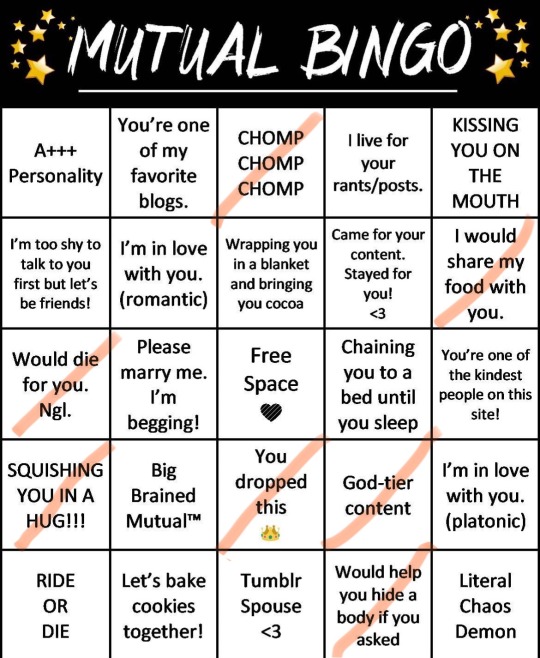
I LIKE YOU A LOT YOU’RE REALLY COOL!!!!!!!!!!
Your art style is so so so so cute and I adore Koi she’s adorable and lovely and my original idea was to have her going fishing with pouncival and I might honestly still do that because it’s a rly rly cute idea to me but first I have to get my seventeen thousand other projects out of the way <3333333
ANYHOW I would help you hide a body, I trust you 100% 🫶🫶🫶
#asks!!!!!!!#why did I put seven exclamation marks why didn’t I put like three what the hellll#I’m a combination of giddy and jittery so I’m super earnest and excitable but also my hands are shaking#bestie I’m so sorry this took so longgggg I don’t know why I just didn’t answer ur question I feel kinda bad ajshsbs s#I am apologizing with tears#ANYHOW I found a rly old looking Kalimba in my basement that I forgot we owned#and I mean OLD this thing looks rusted and hand carved#I was researching them last night to see if I could find a design that looks similar#and most of the instruments have a hole in the center kind of like a guitar#but the one I own doesn’t have that#it’s completely solid#which may be why it sounds so odd#what it does have is a wire bar with three small rings on it#they shake whenever I play notes it’s so weird#I asked my dad where the hell he got it (my father most famous for being a Skimbleshanks hater)#and HE said he got it from HIS mom who got it at a Folk Fair????#so this could be from fucking anywhere#anyhow uh you’re cool and you’re super nice!!! and I’m glad we’re mutuals 🫶🫶🫶
2 notes
·
View notes
Text
#music#beats#new music#youtube#instrumental#audio#design#graphic design#dope beats#ambient electronic#electro music#electronic beats#electronica music#ambient electronic music#electronic music#electronica#dark electro#electro#electromusic#electro house#my music#spotify#ambient music#ambient#chill#study music#music to research to#work music
0 notes
Text
"A team of researchers at Washington University in St. Louis has developed a real-time air monitor that can detect any of the SARS-CoV-2 virus variants that are present in a room in about 5 minutes.
The proof-of-concept device was created by researchers from the McKelvey School of Engineering and the School of Medicine at Washington University...
The results are contained in a July 10 publication in Nature Communications that provides details about how the technology works.
The device holds promise as a breakthrough that - when commercially available - could be used in hospitals and health care facilities, schools, congregate living quarters, and other public places to help detect not only the SARS-CoV-2 virus, but other respiratory virus aerosol such as influenza and respiratory syncytial virus (RSV) as well.
“There is nothing at the moment that tells us how safe a room is,” Cirrito said, in the university’s news release. “If you are in a room with 100 people, you don’t want to find out five days later whether you could be sick or not. The idea with this device is that you can know essentially in real time, or every 5 minutes, if there is a live virus in the air.”
How It Works
The team combined expertise in biosensing with knowhow in designing instruments that measure the toxicity of air. The resulting device is an air sampler that operates based on what’s called “wet cyclone technology.” Air is sucked into the sampler at very high speeds and is then mixed centrifugally with a fluid containing a nanobody that recognizes the spike protein from the SARS-CoV-2 virus. That fluid, which lines the walls of the sampler, creates a surface vortex that traps the virus aerosols. The wet cyclone sampler has a pump that collects the fluid and sends it to the biosensor for detection of the virus using electrochemistry.
The success of the instrument is linked to the extremely high velocity it generates - the monitor has a flow rate of about 1,000 liters per minute - allowing it to sample a much larger volume of air over a 5-minute collection period than what is possible with currently available commercial samplers. It’s also compact - about one foot wide and 10 inches tall - and lights up when a virus is detected, alerting users to increase airflow or circulation in the room.
Testing the Monitor
To test the monitor, the team placed it in the apartments of two Covid-positive patients. The real-time air samples from the bedrooms were then compared with air samples collected from a virus-free control room. The device detected the RNA of the virus in the air samples from the bedrooms but did not detect any in the control air samples.
In laboratory experiments that aerosolized SARS-CoV-2 into a room-sized chamber, the wet cyclone and biosensor were able to detect varying levels of airborne virus concentrations after only a few minutes of sampling, according to the study.
“We are starting with SARS-CoV-2, but there are plans to also measure influenza, RSV, rhinovirus and other top pathogens that routinely infect people,” Cirrito said. “In a hospital setting, the monitor could be used to measure for staph or strep, which cause all kinds of complications for patients. This could really have a major impact on people’s health.”
The Washington University team is now working to commercialize the air quality monitor."
-via Forbes, July 11, 2023
-
Holy shit. I know it's still early in the technology and more testing will inevitably be needed but holy shit.
Literally, if it bears out, this could revolutionize medicine. And maybe let immunocompromised people fucking go places again
Also, for those who don't know, Nature Communications is a very prestigious scientific journal that focuses on Pretty Big Deal research. Their review process is incredibly rigorous. This is an absolutely HUGE credibility boost to this research and prototype
#covid#covid 19#pandemic#plague#rsv#influenza#the flu#science and technology#medical research#medical technology#biochemistry#immunology#good news#hope#hope posting
6K notes
·
View notes
Text
Semantic drift versus ethical drift

Support me this summer in the Clarion Write-A-Thon and help raise money for the Clarion Science Fiction and Fantasy Writers' Workshop! This summer, I'm writing The Reverse-Centaur's Guide to AI, a short book for Farrar, Straus and Giroux that explains how to be an effective AI critic.

More than a quarter-century ago, a group of hackers decided that, as a label, "free software" was a liability, and they set out to replace it with a different label, "open source," on the basis that "open source" was easier to understand and using it instead of "free software" would speed up adoption.
They were right. The switch from calling it "free software" to calling it "open source" sparked a massive, unbroken wave of adoption, to the point where today it's hard to find anyone who will profess enmity for "open source," not even Microsoft (who once called it "a cancer").
Two motives animated "open source" partisans: first, they didn't like the ambiguity of "free software." Famously, Richard Stallman (who coined "free software") viewed this ambiguity as a feature, not a bug. He liked that "free" had a double meaning: "free as in speech" (an ethical proposition) and "free as in beer" (without cost). Stallman viewed the ambiguity of "free software" as a koan/conversation-starter: a normie, hearing "free software," would inquire as to whether this meant that the software couldn't be sold commercially, which was an opening for free software advocates to explain the moral philosophy of software freedom.
For "open source" partisans, this was a bug, not a feature. They wanted to enlist other hackers to develop freely licensed codes, and convince their bosses to adopt this code for internal and public-facing use. For the "open source" advocates, a term designed to confuse was a liability, a way to turn off potential collaborators ("if you're explaining, you're losing").
But the "open source" side wasn't solely motivated by a desire to simplify things by jettisoning the requirement to conscript curious bystanders into a philosophical colloquy. Many of them also disagreed with the philosophy of free software. They weren't excited about building a "commons" or in preventing rent extraction by monopolistic firms. Some of them quite liked the idea of someday extracting their own rents.
For these "open source" advocates, the advantage of free software methodologies – publishing code for peer review and third-party improvement – was purely instrumental: it produced better code. Publication, peer review, and unrestricted follow-on innovation are practices firmly rooted in the Enlightenment, and are the foundation of the scientific method. Allowing strangers to look at your code, critique it, and fix it is a form of epistemic humility, an admission that we are all forever at risk of fooling ourselves, and it's only through adversarial peer review that we can know whether we are right.
This is true! Publishing code makes it better, and prohibitions on code publication make code worse. That's the lesson of the ransomware epidemics of the past decade: these started with a series of leaks from the NSA and CIA. Both agencies have an official policy of researching widely used software in hopes of finding exploitable bugs and then keeping those bugs secret, so that they will be preserved in the wild and can be exploited when the agencies wish to attack their enemies.
The name for this practice is NOBUS, which stands for "No One But US": we alone are smart enough to find these bugs, so if we discover them and keep them secret, no one else will find them and use them to attack our own people. This is a provably false proposition, and a very dangerous one.
The Vault 7, Vault 8, and NSA cyberweapon leaks blew a hole in NOBUS. Failures in the agencies' own security protocols resulted in the release of a long list of defects (mostly in versions of Windows, but other OSes and programs were affected). Malicious software authors used these as can openers to pry open millions of computers, enlisting them into botnets and/or shutting them down with ransomware.
These leaks also provided some "ground truth" for researchers who study malicious software. Once these researchers had a list of which defects the spy agencies had discovered and when, they were able to compare that list of defects that malicious software authors had discovered and exploited in the wild, and estimate the likelihood that a spy agency defect would be independently discovered and abused by the agency's enemies, who they were supposed to be protecting us from. It turns out that the rediscovery rate for spy agency bugs is about 20% per year – in other words, there's a one in five chance that a bug that the CIA or NSA is hoarding will be used to attack America and Americans within the year.
NOBUS is a form of software alchemy. Alchemy is the pre-Enlightenment version of scientific inquiry, and it resembles science in many respects: an alchemist observes phenomena in the natural world, hypothesizes a causal relationship to explain them, and performs an experiment to test their hypothesis. But here is where the resemblance ends: where the scientist must publish their results for them to count as science, the alchemists kept their findings to themselves. This meant that alchemists were able to trick themselves into thinking they were right, including about things they were very wrong about, like whether drinking mercury was a good idea. The failure to publish meant that every alchemist had to discover, for themself, that mercury was a deadly poison.
Alchemists never figured out how to transform lead into gold, but they did convert the base metal of superstition into the precious metal of science by putting it through the crucible of disclosure and peer-review. Both open source and free software partisans claim transparency as a key virtue of their system, because transparency leads to improvement ("with enough eyeballs, all bugs are shallow").
At the outset, "open source" and "free software" were synonyms. All code that was open was also free, and vice-versa. But over the ensuing decades, that changed, as Benjamin "Mako" Hill explained in his 2018 Libreplanet keynote, "How markets coopted free software’s most powerful weapon":
https://mako.cc/copyrighteous/libreplanet-2018-keynote
As Hill explains, the philosophical differences between "open" (making better code) and "free" (making code to enhance human freedom) may not have mattered at the outset, but they each served as a kind of pole star for its own adherents, leading them down increasingly divergent paths. Each new technology and practice represented a decision-point for the movement: "Is this something we should embrace as compatible with our project, or should we reject it as antithetical to our goals?" If you were an "open source" person, the question you asked yourself at each juncture was, "Does this new thing increase code-quality?" If you were a "free software" person, the question you had to answer was, "Does this make people more free?"
These value judgments carried enormous weight. They influenced whether hackers would work to improve a given package or pursue a use-case; they determined who would speak or exhibit at conferences, they created (or deflated) "buzz," and they influenced the direction that new license versions would take, and whether those licenses would be permissible on influential software distribution channels. For a movement that runs on goodwill as much as on dollars, the social acceptability of a practice, a license, a technology or a person, mattered.
Hill describes how chasing openness without regard to its consequences for freedom created a strange situation, one in which giant tech monopolists have software freedom, while the rest of us have to make do with open source. All the software that powers the cloud systems of Facebook, Google, Apple, Microsoft, etc, is freely licensed. You can download it from Github. You can inspect it to your heart's content. You can even do volunteer work to improve it.
But only Google, Apple, Microsoft and Facebook get to decide whether to run it, and how to configure it. And since nearly all the code our users depend on takes a loop through a Big Tech cloud, the decisions made by these Big Tech firms set the outer boundaries of what our code can do. They have total freedom while we make do with the crumbs they drop from on high.
In other words, the freedom mattered, and when we forgot about it, we lost it.
Which is not to say that free software doesn't benefit from open source's popularity. The vast cohort of people who have been won over by open source's instrumental claims to superior code are the top of a funnel that free software partisans can operate to convince these people to consider the ways that their lives have been made more free through open code, and to prioritize freedom, even ahead of code quality.
The free/open source movement is actually a coalition of people who share some goals even if they differ on others. Coalitions are politically powerful. Nearly everything that happens, happens because a coalition has been pulled together:
https://pluralistic.net/2025/01/06/how-the-sausage-gets-made/#governing-is-harder
But coalitions are also brittle, because after they get what they want (transparency for code), then they have to resolve their differences, which means that some members of the coalition are going to be bitterly disappointed.
After all, there's code that we don't want to make better – at least, not if we care about human freedom. For example: code that helps ICE kidnap our neighbors. Code that powers drones. Code that spies on us, both for governments and for private-sector snoops, like the data-broker industry. Code that helps genocidiers target Gazans. Code that helps defeat adblockers. Code that helps locate new sites for fossil fuel extraction, and code that helps run fossil fuel extraction operations. Human freedom has an inverse relationship to this code: the better this code is, the worse off we all are.
Periodically, some free software advocate will follow this to its logical conclusion and propose a new free software license that prohibits use for some purpose: "you may not use my code in the military," or "you may not use my code for ad-tech," or "you may not use my code in ways that despoil the environment."
It's not surprising that this is a recurring event. After all, if you care about software as a tool for enhancing human freedom, and you notice that your code is being used to make people less free, it's natural to want to do something about it.
And yet, every one of these efforts have foundered – and I think every one will. This isn't because ethics clauses in license are a foolish idea, but because they are logistically transcendentally hard to get right.
First, there is the problem of writing good "legal code." Free software licenses are extraordinarily hard to get right. Not only do the terms have to spell out the rights and obligations of participants in the software project, but the whole system needs to be designed so that these clauses can be enforced. The right to sue for breaching a license is determined by "standing" – only people who have been injured by a license violation have the right to seek justice in court. This has proven to be a serious technical challenge in free software licensing, and if you screw it up, you'll end up with an unenforceable license:
https://pluralistic.net/2021/10/20/vizio-vs-the-world/#dumbcast
Even if you figure out all that stuff, it's possible for even extremely talented lawyers working in collaboration with the most ethical of technologists to make subtle errors that take years or decades to surface. By that time, there might be millions or even billions of works that have been released under the defective version of the license, and no practical way to contact the creators of all those works to get them to relicense under a patched version of the license.
This isn't a hypothetical risk: for more than a decade, every version of every flavor of Creative Commons license had a tiny (but hugely consequential) defect. These licenses specified that they "terminated immediately upon any breach." That meant that if you made even the tiniest of errors in following the license terms, you were instantly stripped of the protections of the CC license and could be sued for copyright infringement. Many billions of works were released under these older CC licenses.
Today, a new kind of predator called a "copyleft troll" exploits this bug in order to blackmail innocent Creative Commons users. Multimillion dollar robolawyer firms like Pixsy represent copyleft trolls who release timely images under ancient CC licenses in the hopes that bloggers, social media users, small businesses and nonprofits will use them and make a tiny error in the way they attribute the image. Then Pixsy helps the troll extort hundreds or thousands of dollars from each victim, under threat of a statutory damages claim of $150,000 per infringement:
https://pluralistic.net/2022/01/24/a-bug-in-early-creative-commons-licenses-has-enabled-a-new-breed-of-superpredator/
Creative Commons spent millions over years, working with a who's-who of international copyright and licensing experts, and it took them more than a decade to fix this bug, and the billions of works released under the old licenses are ticking time-bombs. After all, the copyright in those works will last for 70 years after their authors die, which means that anyone who acquires the copyright to those older images could turn troll and go hunting.
There's a reason that old FLOSS hands react with instant derision whenever someone proposes making up a new software license. It's the same reason cryptographers are so hostile to the idea of people rolling their own ciphers: no matter how smart and well-intentioned you are, there's a high likelihood that you will screw up and irrevocably place innocent people at risk. Yes, irrevocably: getting all those creators to relicense their works under a modern CC license is effectively impossible. Even projects with a relatively small number of contributors – like Mozilla – had to resort to throwing away chunks of code whose authors couldn't be located and paying someone to rewrite them under a new license.
Those are reasons not to come up with new free and/or open licenses, period. But on top of that, there's a special set of perplexities and confounders that arise when ethics clauses are added to free/open licenses.
The first of these is the definitional problem. Even seemingly simple categories can elude consensus on definition. Again, the Creative Commons licenses are instructive here: from the outset, CC licenses let creators toggle an ethics clause, called the "NonCommercial" (NC) flag. Works licensed under "NC" couldn't be used commercially. Seems simple, right?
Wrong. For years – and to this day – CC creators and users have been unable to consistently agree on what constitutes a "commercial use." If you post something, in your personal capacity, to a commercial service, is that "commercial?" Well, it had better not be, because anything you find online is going to have some kind of commercial enterprise involved in getting that file to you: a long-haul fiber provider, a data-center, a hosting company, a cloud company, a social media service, etc, etc. If "noncommercial" means "no one can make any money as a result of the distribution of this work," then an NC license would mean that works couldn't be distributed at all (even if you're just printing off copies of a cool image at home and stapling them to telephone poles, the printer ink company and the staple company are making money off of every copy you post).
The CC organization did extensive polling, conducted seminars, consulted experts, and produced a 255-page document that is fascinating and subtle:
https://mirrors.creativecommons.org/defining-noncommercial/Defining_Noncommercial_fullreport.pdf
And even with this document, CC users and creators still argue about whether some users are in and out of bounds.
Now, the CC NC ethics clause is the best case for an ethics clause in a license. CC is a centralized organization that has total authority over the text of CC licenses and exercises near-total control over their interpretation.
Now imagine how a hypothetical ethics clause in a software license would perform, given the CC NC experience. Compared with, say, "military/nonmilitary," the "commercial/noncommercial" distinction is trivial to draw. Is Ford – whose cars are in DoD motor-pools – a "military" user? What if Ford decides to boycott the Pentagon, but the Navy still buys a bunch of used Ford Focuses from a wrecking yard and fixes them up with Ford parts they buy at an Autozone: does Ford now become a "military" user of free/open software?
Categories are clusters, not shapes. This is why the right wing troll mantra "What is a woman?" is so effective: women aren't whats; they are whos, and if you try to come up with a definition that encompasses all the people who are women, it will stretch to dozen of pages and still miss people out. This isn't unique to women – almost every category defies exhaustive definition. Famously, there is no such thing as a fish:
https://en.wikipedia.org/wiki/No_Such_Thing_as_a_Fish#Title
Neither is there any such thing as a name, an address or a date:
https://github.com/kdeldycke/awesome-falsehood
Obviously, the fact that "name" is a slippery concept doesn't stop us from introducing ourselves and referring to one another. But imagine now that we are going to create billions of works whose copyright will endure for more than a century, and if any of them fails to refer to someone by their name correctly, then any of millions of people, some of them not even born yet, could ruin some software contributor's life and maybe the lives of thousand or millions of users of their software.
And "name" – like "noncommercial" – is an easy case. The hard cases are things like "military/nonmilitary," "fossil fuel-sector/non-fossil fuel sector" etc etc. Big, distributed projects with informal institutions and leaders are poorly suited to adjudicating any of these definitional questions, but toothy ethics clauses require these loose ad-hocracies to create and enforce definitions of the most pernicious and slippery concepts of all.
I want to be clear that I'm not opposed to the idea of an ethics clause in free/open licenses. I make extensive use of both the NC and commercial CC licenses, after all. My objections are practical, not philosophical.
A couple weeks ago, I traveled to Rochdale in Greater Manchester to give the opening keynote at the 2025 Coop Congress. After my talk, I was on a panel with Chris Croome, who has been campaigning for a co-op software license:
either enforce co-operation and sharing and do not allow code to be privatised (made proprietary) or code that is released under terms that dictate that if the code is used to run a business the nature of the business must be a co-operative.
https://community.coops.tech/t/co-operative-software-licenses/4421/10
I've been thinking about this ever since and I think all my concerns about other ethics clauses apply here. Admittedly, there is a widely accepted and mature definition of "co-op," the seven "Rochdale Principles":
https://en.wikipedia.org/wiki/Rochdale_Principles
These have been around since 1937, and many of the seeming ambiguities in the language have been resolved through debate over the past 88 years. But there are plenty of entities that are recognizable as "co-ops" that exist outside of the UK, the Anglosphere and the global north that don't embrace all of these principles, or embrace them in ways that fit into the consensus as to their meaning that has emerged among Rochdale-derived co-ops. It's not merely that a "co-op" license might exclude these co-ops, but also that the enforcement mechanism for software licenses is that individual software authors retain the copyright to their lines of code, and use copyright law to threaten and punish people who violate the license terms.
This means that you could have a pool of potentially thousands of software authors, and their literary estates, who would have the right – for more than a century – to attack co-ops that use "co-operatively licensed" software on the grounds that the differ in their interpretation of what is – and is not – a co-op.
What's more, there are plenty of groups that could organize as a co-op and satisfy the software license's definition, who might nevertheless not be "ethical" by the lights of the co-op movement. Think of a firm of mercenaries that set up as a worker co-op (if this strikes you as implausible, I remind you that the most vicious, human-rights-abusing cops in the world are mostly members of "unions").
So a co-op license creates three risks:
Excluding co-operators because of small differences in which co-op principles they adopt;
ii. Including co-operators who are structured as compliant co-ops, but do terrible things; and
iii. Putting license users at the risk of copyleft trolls who exploit ambiguity in the definition of "co-op" to extort massive "settlement fees" from software users.
That all said, a co-op license has positive aspects as well. Remember what happened when we stopped stressing "freedom" in our software licenses: we got the code quality of "open," applied to all kinds of code, including code that destroys freedom. I've been involved with co-ops since I was a pre-teen, and I've experienced firsthand what happens when a co-op forgets its ethical basis in favor of instrumental goals.
Take the Mountain Equipment Co-Op, Canada's most beloved and successful consumer co-op. MEC was inspired by the US outdoor gear co-op REI, and it served Canadians proudly for decades. But like most consumer co-ops, MEC had very low member involvement, so a cabal of MBA-poisoned looters were able to take over MEC's board, change the bylaws, and then flip the co-op to a ruthless American private equity fund:
https://pluralistic.net/2020/09/16/spike-lee-joint/#casse-le-mec
MEC isn't a co-op anymore. The board's argument was that keeping MEC a co-op wasn't as important as infusing it with capital so it could source the goods its members wanted and offer them at reasonable prices. Joke's on them: after five years of PE looting, MEC's quality sucks and its prices are sky-high.
Institutional structure (like whether you are a co-op or not) can influence the kind of activity an organization engages in, but it can't control it. Keeping enshittification at bay requires multiple, overlapping constraints that prevent the institution from caving into the worst instincts of its worst members. That's why I'm rooting for Bluesky to become more federated. It's nice that they're structured as a B-corp, but that alone won't stop a dedicated investor class from replacing the current management with enshittifiers who destroy the lives of tens of millions of Bluesky users. However, if a large plurality of Bluesky users weren't actually on Bluesky, but on federated servers, they could credibly threaten Bluesky's business by defederating with it if it enshittified:
https://pluralistic.net/2025/01/23/defense-in-depth/#more-10160
So maybe the prospect of losing access to all of its business-critical software could have acted as a check on MEC's board and prevented them from sleazing up to private equity vampires. This is certainly a possible benefit to a co-op ethics clause in a software license. I'm not convinced that it outweighs the risks, though.
I'm a free software person. There are bitter free software partisans who think that the open source people stole our revolution. I understand their outrage. But I also think we left an open goal. In retrospect, choosing a deliberately confusing name in the hopes of sparking conversations was a tactical error. The cohort of potential movement supporters who also enjoy word-games is smaller than the cohort who are put off by being deliberately confused.
I also don't think it's a problem that the software freedom coalition includes people who value software freedom for purely instrumental reasons – because open code is better code. I do think it's a problem that they are the senior partners in the coalition and have steered it for a quarter-century. After all, they steered it into this ditch where tech monopolists have free software and we all make do with open source.
Coalitions, though, are hugely important. Take the as-yet-nameless coalition lined up against corporate power, which has defied political science's laws of gravity, pushing antitrust enforcement across the world, against the world's largest and most powerful corporations:
https://pluralistic.net/2025/06/28/mamdani/#trustbusting
This coalition needs a name. I often cite James Boyle's explanation of the role the word "ecology" played in bringing together thousands of disparate issues (spotted owls, ozone depletion) under a single banner and turning them into a movement. The anti-corporate-power movement doesn't have a name that can unite labor, climate, environment, antitrust, anticorruption, antigenocide, antiracist, antisexist, antitransphobic groups under one banner. Almost all of our definitional terms are "anti-something," from "antitrust" to "antifascist." We have no end of words to describe what we stand against (even "enshittification"'s opposite is "disenshittification"), but we still lack a word to express what we're for.

If you'd like an essay-formatted version of this post to read or share, here's a link to it on pluralistic.net, my surveillance-free, ad-free, tracker-free blog:
https://pluralistic.net/2025/07/14/pole-star/#gnus-not-utilitarian

Image: Muhammad Mahdi Karim https://commons.wikimedia.org/wiki/File:Blue_Wildebeest,_Ngorongoro.jpg
GNU FDL https://www.gnu.org/licenses/fdl-1.3.html
--
EC https://www.flickr.com/photos/baumderjustiz/4797771263/
CC BY-SA 2.0 https://creativecommons.org/licenses/by-sa/2.0/deed.en
#pluralistic#language#activism#floss#foss#free software#gnu#open source#oss#open source software#technology#pluralism#mako#benjamin mako hill#benjamin hill#copyleft trolls#semantics#semantic drift
268 notes
·
View notes
Text
Tennis for Two was designed by American physicist William Higinbotham in 1958 for display at the Brookhaven National Laboratory's annual public exhibition after learning that the government research institution's Donner Model 30 analog computer could simulate trajectories with wind resistance. The game was displayed on an oscilloscope and played with two custom aluminum controllers. An oscilloscope is a type of electronic test instrument that graphically displays varying voltages of one or more signals as a function of time.
#video games#pong#1950s history#technology#aesthetic#vintage#retro aesthetic#oscilloscope#old school cool#style#physics#analog#boing boing#origin story
356 notes
·
View notes
Text

𓏵 UNIQUE HOBBY IDEAS
─ ─ ─ ─ ─ ─ ─ ─ ─ ─ ─ ─ ─ ─ ─ ─ ─ ─
┆ARTSY
upcycling clothes
making comics
sculpting
writing
embroidery
calligraphy
tattoo art
poetry
origami
doing nails
mixed media/collages
photography
film-making
fashion design
candle making
knitting
sewing
pottery
scrapbooking
jewlery making
─ ─ ─ ─ ─ ─ ─ ─ ─ ─ ─ ─ ─ ─ ─ ─ ─ ─
┆SPORTY
parkour
rock climbing
hiking
surfing
yoga
running
dancing
skating
boxing
martial arts
ice skating
─ ─ ─ ─ ─ ─ ─ ─ ─ ─ ─ ─ ─ ─ ─ ─ ─ ─
┆MUSIC RELATED
playing an instrument
songwriting
singing
beatboxing
making playlists
DJing
─ ─ ─ ─ ─ ─ ─ ─ ─ ─ ─ ─ ─ ─ ─ ─ ─ ─
┆MORE
gardening
jam making
camping
researching/studying
collecting something
journaling
sleeping
meditating
flower bouquet creating
creating presentations
micecraft house designing
making little doll houses
trying cool hairstyles
coctail making
making video games
keeping a blog
cooking/baking
chess
robotics
shopping
lockpicking
magic tricks
urban exploring
going to concerts
tarot
traveling
making animations
watching movies
language learning
world building
fishing
metal detecting
astrology and birth chart reading
shifting
acting
knife throwing
creating recepies
making cool outfits on pinterest
making zines
character creating
street photography
#hobby ideas#hobby#hobbies#reality shifting#shiftblr#shifters#shifting#shifting antis dni#shifting blog#shifting community#shifting consciousness#shifting diary#shifting script#shifting ideas#shifts#shift#shiftingrealities#shifting realities#things to script#scripting#desired reality#deminetly shiftblr#deminetly#deminetly activities
287 notes
·
View notes
Text


‘Incredible’ Mosaics Were Found in an Ancient Luxury Home in Rome
Italy’s Culture Minister Gennaro Sangiuliano has called the works “an authentic treasure.”
Researchers working in the Archaeological Park of the Colosseum in Rome have shared their discovery of luxurious mosaic-tiled rooms found in an ancient home on the site, which they believe may have belonged to a Roman senator. Created from shells, glass, white marble, and Egyptian blue tiles, the mosaics have been described by Italy’s Culture Minister Gennaro Sangiuliano as “an authentic treasure”.
The “rustic” mosaics, found on the grounds surrounding the Colosseum in the heart of the city, date to the late Republican Age, in the last decades of the second century B.C.E., and show a series of figurative scenes. They once decorated a townhouse, or domus, owned by an upper class citizen. Italy’s Ministry of Culture have said that “due to the complexity of the scenes depicted” and their age, the mosaics are “without comparison.”

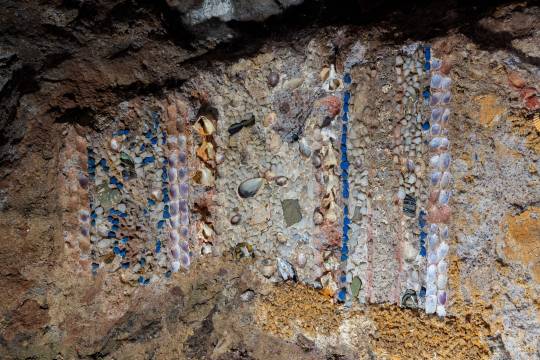
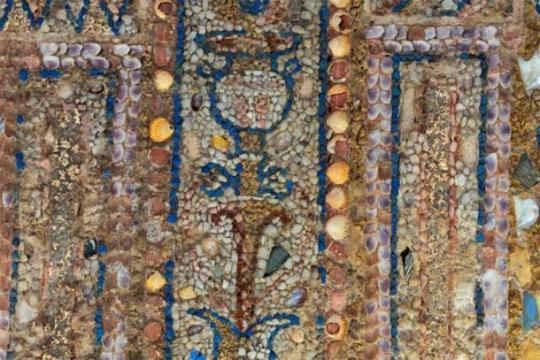
One mosaic depicts a coastal city with towers and porticos, with three large ships floating by on the ocean waves. The culture ministry believes this could be a reference to naval victories achieved by the owner of the home, which is believed to have been a Roman senator. This is supported by historical sources describing the area as having been occupied by such high-ranking members of society.
The decorated walls were likely located in the home’s dining rooms, where luxurious banquets would be hosted, and guests at these events were likely wowed with “spectacular water games,” according to the culture ministry, based on the presence of lead pipes set into the walls.
In the reception room, an extremely well preserved decorated stucco featuring landscapes and figures was also discovered. Other designs include vines and lotus leaves flowing from vases, musical instruments, and tridents.
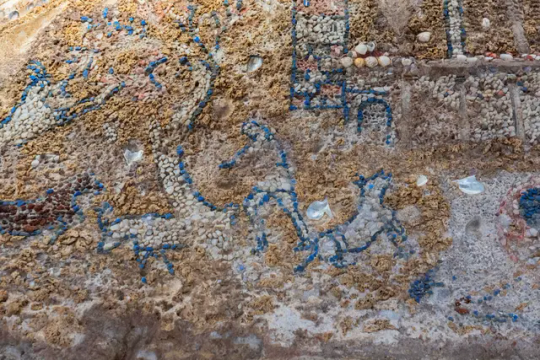
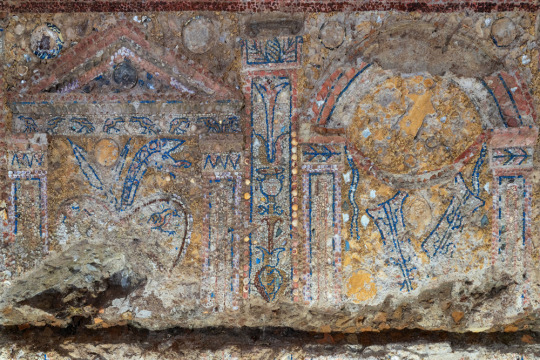

The mosaic walls were first discovered near the Colosseum in 2018, but excavation at the site will continue into 2024, and more rooms could be discovered. Alfonsina Russo, the Director of the Archaeological Park of the Colosseum, has said that once the domus is full uncovered, “we will work intensely to make this place, among the most evocative of ancient Rome, accessible to the public as soon as possible.”
By Verity Babbs.
#‘Incredible’ Mosaics Were Found in an Ancient Luxury Home in Rome#Archaeological Park of the Colosseum#Late Republican Age#second century B.C.E.#mosaic#roman mosaic#ancient artifacts#archeology#archeolgst#history#history news#ancient history#ancient culture#ancient civilizations#ancient rome#roman history#roman empire#roman art
1K notes
·
View notes
Text

[UNIDENTIFIED] unlocked codex
LOCATION DESIGNATION: Outer Ring of the Riven Expanse
STATUS: Fractured perimeter zone [Stabilized, contested]
NOTES ON ACCESS: Restricted to authorized Pathfinders and Runners only
“The trees forget the hands that shaped them. Tongue of rot. Tooth of renewal.”
— Anonymous runners diary, salvaged at 89.29891,-21.84670
Suspended high upon the bone-like lattice of ancient trees, the Outer Ring is the last veil of order before the wilderness swells into its endless, unshaped heart.
The walkways rise like a second spine across the forest canopy. They bear the weight of countless Paths taken, countless footprints pressed into salt-streaked planks. Here, Runners and Pathfinders trade whispers and scars, making ready for sorties into the heart of the woods.
Each path is marked by sigils and knots, some official, many unofficial — wards scrawled by desperate hands. All agree upon one rule:
Never walk alone. Never walk at dusk. Never trust silence.
Researcher’s Note: The deep is suspected to operate upon an unknown physical logic. Periodic excursions conducted to map its terrain have yielded no coherent cartography. Teams return fragmented, their instruments rendered meaningless. Occasionally, the forest itself returns fragments of those departed — a boot, a horn, a page from a waterlogged journal — deposited upon the walkways as if to mock the endeavor.
#ouroboros-if#interactive fiction#codex#Those of you who haven't seen me be giddy on the forum or such lemme show you a snippet of a codex entry. I'm still workins on the layout#but!!! I'm kinda in love with the tone of the codex (it has narrative significance#not just info#it...gives and takes.) it's oakwerthian so idk what pf expected#>:3#Ok bye!!!! see you sometime maybe!!
128 notes
·
View notes
Text
Oh, right! Remember I said Lya was carrying Robin's twins?

And if they're two girls, Aria is getting a twin sister, if they're twin boys they're gonna be added to the kids' squad at the Farm? Well, here they are! The Homestead AU gets an update with the twins' arrival!
Allow me to introduce: Aria and Sonata!!
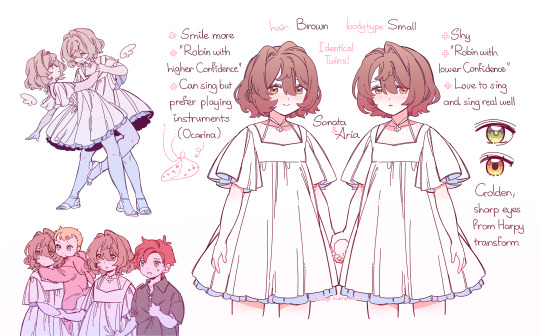
More information and images under the cut!
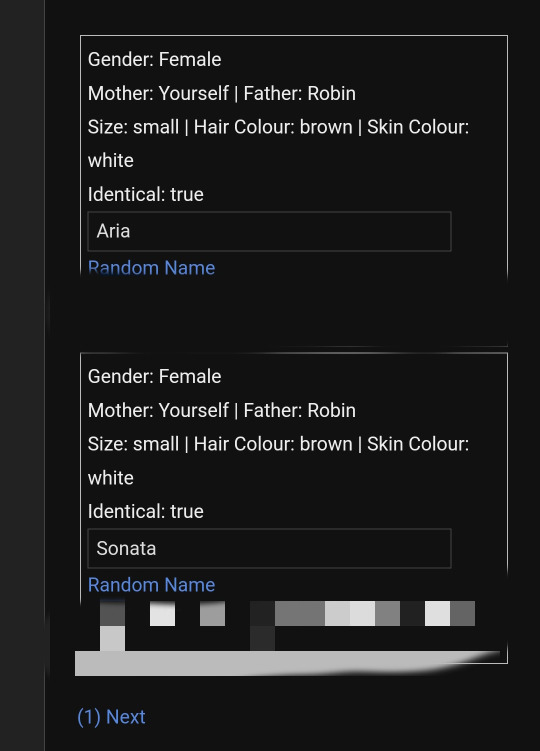
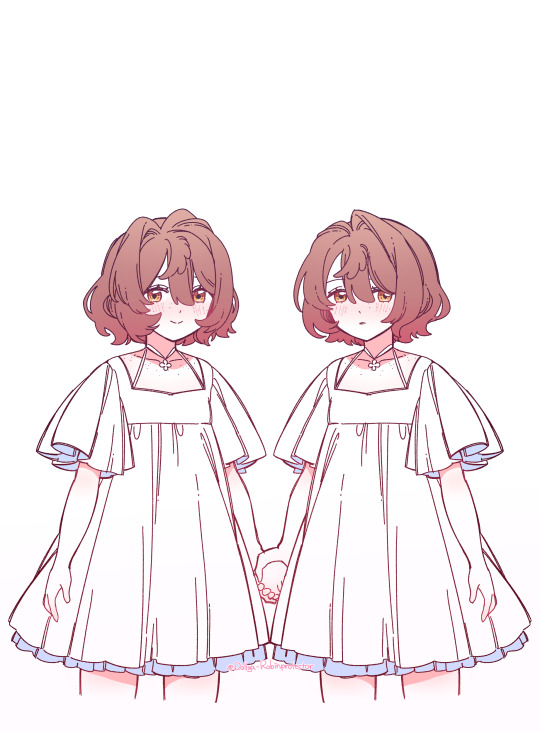
They're identical, so I don't make anything different for Sonata from Aria, I just updated the already-there Aria's design. Though if you look at them long enough surely you'll see some differences.
Aria and Sonata, besides their obvious meanings in English, also have their respective meanings in Japanese Kanji.

Aria - 照愛 with 照 (Teru) means to Shine, to Illuminate and 愛 (Ai) means Love, Affection, to love and to cherish.
Sonata - 空遥 with 空 (Sora) means the Sky, Aether and 遥 (Haruka) means Faraway, Distant.
Their name combined into a Symphony, as well as something like "A vast blue sky illuminated by your love"
Muahahahaha these are genius I'm such a name-meaning nerd ( I research my ass off for these names despite the fact I don't know a single Kanji thank you Google-san)

Their personalities also match their name, as I expected. Aria is the more "quiet and thoughtful" one. While Sonata is clearly a more "cheerful and active" one. While Aria had some up-and-down moods, Sonata stays gleeful.
First interaction and Aria is already catching a song.


Due to the inheritance Harpy transforms through their mother, they're both musically gifted and have Sharp Eyes. I've mentioned before that Aria can sing well, now, for Sonata, she probably can sing too but would choose to play instrument instead. They're big sisters among the kids, and Sonata would blend in very well since she's just like Aria. and they're inseparable.

"Okay guys, the bad guys are here tonight as well. So we should behave and sleep by ourselves. Maa and Dad and Pat will be busy."
"At least Paa will stay with us. Ya, that's right Nora~"
"I'm scared... Will Ma and Dad and Pat be okay?"
"They will Zan, they surely will."
#I'm having a BABY FEVER AAAAAAAAAAAA#hashtag: proud meemaw drawing her grandchildren#dollya art#dol#degrees of lewdity#dol fanart#robin the orphan#dol robin#DoL: Homestead AU#tw pregnancy#cw pregnancy
369 notes
·
View notes
Text
△◬▲ Avengers' Hobbies ▲◬△
Here are some hobbies and interests that I think the Avengers will have when I shift, including my own that I already have here. I will probably update this when I shift and we'll see if I'm right! Some of these are canon, but I'm throwing them in here for fun anyway.
△◬▲◬△
▲ Tony
△ Rubik's cube (and other little puzzles) - That brain of his must have mastered it in a day, so he probably does it mindlessly while he thinks.
△ Formula 1 - As seen in the MCU. But it's SO fitting for him, I just have to put that out there.
△ Concerts - He loves a good party and, based on his t-shirts, he seems to love music. I wouldn't be surprised if he just hangs out on the side of the stages because he's Tony Stark and can.
△ Design - He's made quite a few suits, so I can see him really getting into the creative aspect of things. This applies to all of his inventions too. They have to look as "cool" as he does, right?
▲ Rhodey
△ Reading - Give this man a newspaper or a biography or something, he'll be set.
△ Pool & Ping Pong - Somehow, someway, he's just way better at both of these than 94% of the population. And yes, he will definitely rub it in your face.
△ Piano - I feel like his mother or grandmother taught him how to play when he was young so it's a very sentimental talent of his.
▲ Peter
△ Photography - Obviously. That little stinker is too talented for his own good.
△ Tinkering in the Lab - Based on his enthusiasm in the MCU, I think he spends a lot of his time just messing around in the lab, even if he's alone, though of course he prefers to have company. He gets so excited when an idea of his works.
△ Quality Time - Like I mentioned, he likes company. He might be a little awkward sometimes, but I think that's what makes that time with people mean so much to him. It makes him happy to know that people want to hang out with him.
△ Slacklining - Hear me out. He uses his webs to create a makeshift slackline across buildings or whatever. Maybe he's on a stakeout and gets bored, I don't know, but he's damn good at it.
▲ Bruce
△ The Opera - As we saw in the MCU, he uses music to calm himself down. But I think he has a deeper connection and fascination with it than most may notice. There's something about the harmony between all of the instruments and voices that mesmerizes him. He could go on and on about it, and I can't wait to listen to him rant when I shift!
△ Scientific Research - If he's not the one doing the research, then he's reading all about it. He loves hearing other people's discoveries and he craves getting all the knowledge he can.
△ Meditation - With all of the Hulk nonsense, he got into it to help his anger. Maybe it works sometimes and doesn't other times. I don't know, but I think he has grown to love the process.
▲ Thor
△ History & Storytelling - As we know, he loves sharing stories of his own, but I think he also enjoys hearing them from others. He might one up them afterwards... Still, though. He really likes learning about makes people and places the way they are: their history and experiences.
△ Tests of Physical Strength - He has strength, a lot of it, and he likes to show it. He loves competitions between the Avengers (and winning). Even tug of war, he'll be there.
△ Singing - He sings in the shower. There's no way he doesn't. And he's actually quite good. For some reason, I feel like he might not do it in public much (unless he's drunk or joking around). Maybe it's an Asgardian culture thing.
▲ Scott
△ Scott is just excessively talented for no reason. He can learn any skill. It's actually kind infuriating. Anyway, I'll list a few.
△ Magic, Drums, Arts and Crafts, Card Games, Juggling, etc...
▲ Pietro
△ Sports - He's ridiculously athletic. He has mastered every sport. He probably doesn't even need his powers to be good at them. He's just a boss man like that. I do think his specialty is soccer (football, I know; I'm American, I'm sorry), as in I think he probably played it as a child and was obviously the best.
△ Wii Sports - He's unstoppable. No one can beat him. He has set impossibly high records. Still, he loves playing them so much.
△ Just Dance - Yeah, it's the same situation as the Wii. Those hips don't lie. Unfortunately, this means that it's very hard to convince people to play with him. He happily plays by himself, but of course it's more fun with other people.
▲ Wanda
△ Cooking - As seen in the MCU, but I'm so excited to taste her creations, are you kidding? I bet she finds all sorts of cute recipes on Pinterest too.
△ Ukulele - I remember seeing a guitar in her room in the Compound (Civil War I think?), but I think she started with a little ukulele! Maybe her parents bought her one for her birthday and she was devastated that she lost it during the incident we shall not name. She's such a sweetheart, I can't.
△ Crochet - She could probably crochet using her powers with her eyes closed. I also think she likes doing it to practice her control of her powers for precision purposes.
△ Jigsaw Puzzles - Just like I previously mentioned, I think she enjoys it for practicing her powers, but I also think she likes the peacefulness of it.
▲ Clint
△ Pool - Remember when I said that Rhodey is better at pool than 94% of the population? Yeah, Clint is the one person he can't beat. His aim is unearthly.
△ Harmonica - This guy will whip out a harmonica out of nowhere (one of his many pockets) and give the crew a nice little tune. He's quite skilled too. Name any song and he'll learn it for you in an hour.
△ Card Games - He may act nonchalant or like he doesn't really care about the game, but he will turn around and win with one incredible move and blow everyone's minds, then shrug like it was nothing. That brain is bigger than we give him credit for, I'm calling it right now.
△ Surfing - He just has that vibe. Not the stereotypical surfer dude, but a guy who will casually surf a forty-foot wave after he finishes a mission in Fiji or something. He's cool like that.
▲ Nat
△ Ballet - Despite all the trauma associated with it, I think she still has a soft spot for dancing. It was such a major part of her life for so long, so maybe she does it to heal her inner child.
△ Yoga - She has to stay flexible somehow, right? Also, I think she'd enjoy doing it to calm down after a mission or when she's stressed.
△ Aerial Silks - Speaking of flexibility... Same goes for this! She does all sorts of cool tricks too.
△ Hair - Her hairstyle changed like every movie, who has time to go to a hairdresser when you're a super spy? That lovely lady learned to cut and dye it herself, and I'm sure she'd happily do it for others if they ask. (*Nat and Steve will be together in my DR and I bet she cuts his every time!)
▲ Steve
△ Drawing - As seen in the MCU. He definitely doodles during meetings.
△ Calligraphy - Writing in cursive was way more common and just what everyone did. So, due to his physical limitations, I think he probably spent a lot of time practicing his penmanship and perfecting its art form, especially while he was sick. Drawing and writing were two of his major pastimes.
△ Running - Since he kind of couldn't, or rather, couldn't to the average extent or the extent he wanted to, he takes advantage of his abilities now. He loves the rush too. Can't relate, but go you, Steve!
△ Museums - He likes catching up on what he missed, but also enjoys the stories the world holds. He has always like history, so learning everything about the past seventy years and the rest of time keeps him busy.
▲ Sam
△ Cooking - As seen in TFATWS. But I also think he loves food and is totally a food critic, so obviously he wants to have the best cuisine on deck whenever he wants.
△ Psychology - Since he was a counselor for veterans, I think psychology interests him a lot more than some think. He may be a goof, but there's some wisdom inside him too.
△ Chatting - It's his favorite thing to do. He could talk for days straight. He loves it so, so much.
△ Board Games - He might get a little distracted during card games, thanks to the chatting, but if a board game is pulled out, he is completely invested. There's something about the map-like structure that makes his brain spark.
▲ Bucky
△ Reading - As seen in TFATWS. He loves a good fantasy book to take his mind to a different, sometimes better place.
△ Welding - He would be so good at this. I don't he did this exactly on Sam's parents' boat, but I'm sure he has the mechanical experience.
△ Repairs - As seen in TFATWS. I think he really likes fixing things, having the control to make something right and doing it, even if it's something small like a leaking faucet. It makes him feel helpful.
△ Gardening - Hear me out, stay with me. Imagine how much love and effort he would put into a couple plants, even if they're just houseplants. That nurturing side of him that he showed to Steve in the forties must still be in there. He wants to nurture something (and someone, aka me lol) in the way no one did for him when he was a slave for HYDRA. And once he masters it, he's damn good at it.
△ Games - As seen in TFATWS. There's playfulness in him past the brooding.
▲ Me
△ Abstract painting - I've been painting for a few years now and I love it! I just play some music and zone out, letting the paint take me away... I'm excited to make some art for people's birthdays and whatnot when I shift, just like I do here!
△ Baking - I definitely prefer baking over cooking. Give me a recipe and I can make anything. Plus, I have a major sweet tooth. My CR mom tells me that baking is my love language and she's not wrong.
△ Writing - Creative writing is my passion! I have so many possible book ideas, we'll see if I actually write any of them someday. I certainly want to!
#shiftblr#shifting community#shifting#shifting blog#shifting motivation#reality shifting#reality shifter#shifting realities#marvel dr#shifter#mcu dr#mcu desired reality#mcu reality shifting#mcu shifting#mcu headcanons#marvel reality shfiting#marvel headcanons#avengers headcanons#marvel shifting#marvel desired reality#marvel#shifters#desired reality
109 notes
·
View notes
Text
#music#beats#new music#youtube#instrumental#audio#design#graphic design#dope beats#ambient electronic music#electronic music#electronica#electro#electro music#ambient electronic#electronica music#electronic beats#ambient techno#ambient music#ambient#spotify#my music#chill#chill music#chill vibes#chillout#deep focus#study music#music to research to#inspiring music
0 notes
Text

Hi! This is a blog dedicated to the Rizzard of Waterdeep 💜
I was asked to create a blog master list, so I’m happy to oblige. Below are links to my design works, my answered asks, and some fic rec lists.
I’ll have my Ask Button active whenever possible. If it’s deactivated that just means I’m catching up or cannot answer at this time. See the EXTENSIVE list under the cut for previously answered asks!
Thanks for visiting :)

Graphic Designer Gone Wild:
Bg3/Gale Spoof Magazine #1
Bg3 Spoof Magazine #2
Bg3/Gale Spoof Magazine #3
Gale’s Compendium of Puns
Gale and Tav’s Wedding Invitation
Galentines
A Magical Valentine from Gale (different each time you click)

Answered Asks *rules about submitted asks*
How would Gale deal with:
an elf Tav with a long lifespan
a rude salesperson/fast food worker
making amends to Tav after being immersed in research
an ill Tav
a weary Tav who refuses to rest
romantic competition for Tav
a Tav who isn’t doing well emotionally or mentally
jealousy between Tav and Tara
celebrating Tav’s birthday
warding/protecting his tower
Tav teasing him/making him feel flustered
A Tav asking for book recommendations
a pregnant Tav especially one who is trans/gnc
he and Tav adopting & hatching the githyanki egg
18+ Tav sending him a naughty message
companions losing their minds when they see he has abs
Tav confessing they are a Bhaalspawn
the stress of writing/being creative
an overworked/stressed Tav
A Tav who is legitimately angry at him
The neighborhood HOA filing complaints against him and Tav
A Tav who is desperate to keep Gale alive
Celebrating Valentine’s Day / courting Tav
a Tav that previously was in an abusive relationship
Marrying a Tav with little/no family
18+ an anxious Tav who avoids eye contact
Family disapproval
His beloved’s unique mannerisms
Mystra threatening Tav’s life
Finding Tav reading a smutty book
What are Gale’s:
flaws
preferred ways to exercise
compliments he gives to others
thoughts on tattoos
thoughts on sharing his home with Tav
things that give him the ‘ick’
motivations for his shadowlands flirting
18+ best and worst things in bed
Would Gale still love Tav if (tldr; the answer is always yes):
Tav was a gnome
Tav struggled with horrible nightmares
Tav had chronic pain
Tav was drunk
Tav gained weight
Tav was plus-size or chubby
Tav had sensory issues
Tav was never desired by anyone/has always been overlooked romantically
Tav had scales
Tav was a Dragonborn
Tav had PTSD
18+ Tav was vanilla/not kinky
Tav was quiet/not a yapper
Tav was ace
Tav was NOT quiet/IS a yapper
Tav had an overbite/is insecure about their smile
Tav was from our world
Tav had stretch marks/physical imperfections
Tav was ‘wild’ / uneducated
Tav wasn’t very confident in themselves
Tav didn’t think they had a good personality
Tav was………a bit gassy
Tav had epilepsy and struggled with seizures
Tav was a vegan or vegetarian
Tav was transforming into a drider
Tav was from a noble line and in grave danger
Various:
18+ Gale may have picked up some Tressym mannerisms
What would Gale’s mother Morena think of Tav
Gale loves Tav much more than he ever loved Mystra
Gale’s shared interests with each of the companions
What type of music does Gale like/what instruments does he play
Dad!Gale watching Tav and their little one
18+ Tav making Gale fail NNN
18+ Gale succeeding at NNN and being rewarded
Would Gale give up his Godhood to be with a mortal Tav
Could Gale ever end up with a Tav who refused his proposal
Can Gale sing
18+ is Gale more of a boobs or butt kind of guy
would Gale put up mistletoe for the holidays
Gale as a girl dad
18+ Why do Gale’s boxers have magic/why are they enchanted
About Gale’s kisses
About Gale’s romance endings
18+ Would Gale enjoy…
how does Gale immediately know Tav is a wizard/sorcerer/non-magic user
‘Early Access’ Gale and Mystra
Gale left waiting in the fugue plane

Fic Recs for Galemancers
18+ General recommendations
Comfy/Cozy fics
18+ Smut fics
#Even I hadn’t realized how many asks I’d answered until I saw them all listed lol#I will update here as new ones are answered!#gale of waterdeep#gale dekarios#baldur's gate 3#gale x tav#galemancer#bg3
77 notes
·
View notes
Text
LOVE INTEREST TYPOLOGY, TWO.



I JUST THREW OUT THE LOVE OF MY DREAMS looking for inspiration for your love interest? maybe you have a fandom-based significant other you want to fit your dr better, or maybe you want to start from scratch and create your own significant other? feel free to use this for yourself or even friends, but this held romantic intentions and was requested.

these are all best for whatever you would like but i see them more commonly in small towns, romcoms, and high school / college realities. geeky articulation with a shy, low, or demotivated social aspect, quirky and humorous when they finally open up. keeper of messenger bags and rectangular glasses, brown converse and silly socks. are you copper and tellurium? because you're cute! get it? no? tough crowd... these things make me think of the following tropes and character labels. THE NERD. THE ACADEMIC ATHLETE. GUY NEXT DOOR. THE CLOSET GEEK.

FACE CLAIMS. marcus scribner. algee smith. justice smith. xu minghao. jordan gonzalez. aramis knight. anirudh pisharody. j.q. quintel. dane dehaan. sam marin. jordan fisher. elliot fletcher. 2000s matthew lilard. 2000s jared padalecki. matthew gray gubler. chidi anagonye. danny pudi. paul dano. cory michael smith. matt bennett.devon bostick, as always. dev patel. freddy carter. tyler james williams. mark eydelshteyn.ivan mok. frank waln. bayardo de murguia. tokala black elk. dakota beavers. phillip bread. tom holland. josh o'connor. lakeith stanfield. daniel kaluuya. lil rel howery. alfred enoch. literally any man who has played spiderman. asia jackson. halle bailey. lola tung. storm reid. emily alabi. kylee russell. minnie mills. maitreyi ramakrishnan. lee joo-won / jooe. reina triendl. tomoko kawase. jazz jennings. amita suman. won minji. amber midthunder. anya taylor joy. ayo edibiri. ayesha madon. ashley argota. billie lourd. benedetta gargari. belissa escobedo. zion moreno. zhou dongyu. margaret qualley. nicole kidman. katheryn winnick. grace van dien. birgundi baker. bailey bass. lee jinsook. tiffany meia. thaddea graham. rio uchida. sheena lim. ramona young. 2000s america ferrera. park so dam. neelam gil. cierra ramirez. haskiri velazquez. doechii. eva noblezada. isabella lovestory is perfect for the closet geek.
PERSONALITY TRAITS. witty. clever. intelligent. incentive. original. aloof. responsible. patient. ambitious. resourceful. loyal. genuine. honest. open-minded. introverted. determined. esthetic. humorous. optimistic. idealistic. committed. carefree. daring. friendly. quiet. shy. strong individualism. thoughtful. well-mannered. unafraid to state their own ideas and opinions. sweet. good-natured. maybe even confident or brave. cutely awkward. analytic. empathetic. driven to do what's right. traits i think align more with the closet geek instead of all tropes are charming. bold. admirable. lively. romantic. leader. debonair. daring. friendly. fun-loving. hedonistic. suave. optimistic. self-reliant. fierce. sociable. idolized. center of attention.
HOBBIES AND HABITS. collecting, maybe comic books or action figures. coding. programming. cinephilia. hacking. reading. board games. cosplay. some form of art, such as drawing or ceramics. video games. photography. studying/researching. puzzles. lego building. something with science or math. blogging. fashion or robotics design. playing some sort of instrument, like the piano. table tennis. scrapbooking. repairing or building electronics. speedsolving.
LOVE LANGUAGES. words of affirmation. resting their lips against your lip, not necessarily kissing. hand holding under desks. puppy dog eyes when they really want to hang out with you. telling you all about their interests and teaching you the rules to their favorite board games. weird, but reading wiki articles together—trust me. melting every time you kiss them. quality time. the whole smiling and giddy attitude when you get mentioned or they get to see you soon. prank wars, but not the obnoxious ones youtubers do nowadays.

POSSIBLE AESTHETICS. for the closet geek, i think of baddie. 2000s party girl. indie sleaze. bloghouse. britpop. mcbling. succubus chic. agejo. kurogal. shoe diva. in general, i think of nerd/geek. prep. office siren. all forms of academia. supernatural (tv show) is an aesthetic if you believe in it hard enough. balletcore. amekaji. twee. kogal. scene. indie. tweemo. related pinboard.










#do i still got it (exhausted)#shifting antis dni#anti shifters dni#shiftingrealities#desired reality#dr self#shifting#dream reality#desired reality self#shifting to desired reality#reality shifting#realityshifting#reality shift#shifting reality#reality shifter#shifters#shifter#shifting realities#shifting community#reality shifting community#shiftblr#shiftblr community#shifttok#shifting blog#shifting ideas#shifting motivation#shifting help#ideas for shifting#western dr#shifting inspo
129 notes
·
View notes